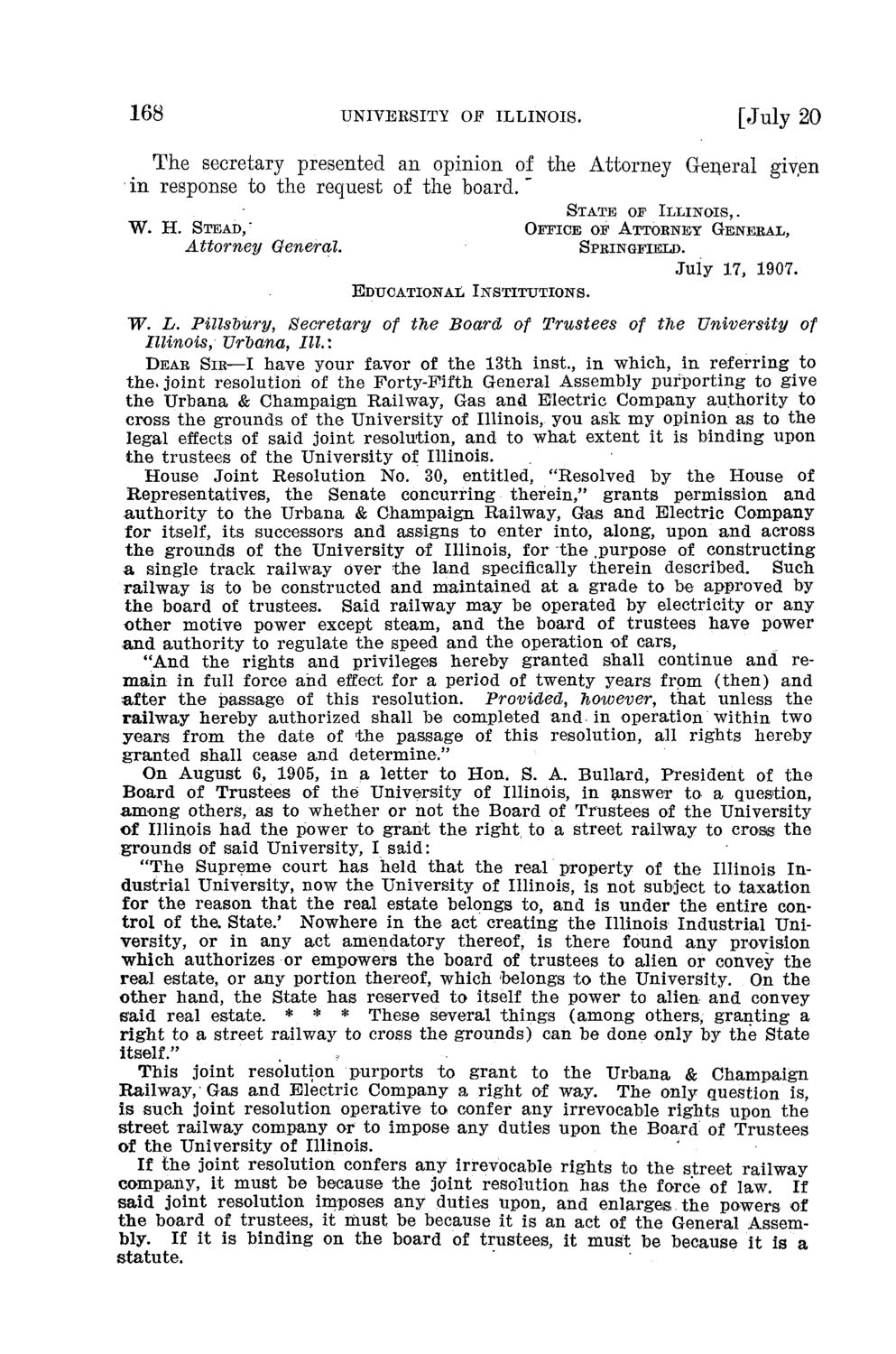| |
| |
Caption: Board of Trustees Minutes - 1908
This is a reduced-resolution page image for fast online browsing.

EXTRACTED TEXT FROM PAGE:
168 UNIVEESITY OF ILLINOIS. [July 20 The secretary presented an opinion of the Attorney General giyen in response to the request of the board." W. H. STEAD," STATE OF ILLINOIS, . OFFICE OF ATTOBNEY GENERAL, Attorney General. SPRINGFIELD. July 17, 1907. EDUCATIONAL INSTITUTIONS. W. L. Pillsbury, Secretary of the Board of Trustees of the University of Illinois, Urbana, III.: DEAR SIR—I have your favor of the 13th inst., in which, in referring to the. joint resolution of the Forty-Fifth General Assembly purporting to give the Urbana & Champaign Railway, Gas and Electric Company authority to cross the grounds of the University of Illinois, you ask my opinion as to the legal effects of said joint resolution, and to what extent it is binding upon the trustees of the University of Illinois. House Joint Resolution No. 30, entitled, "Resolved by the House of Representatives, the Senate concurring therein,'' grants permission and authority to the Urbana & Champaign Railway, Gas and Electric Company for itself, its successors and assigns to enter into, along, upon and across the grounds of the University of Illinois, for the .purpose of constructing a single track railway over the land specifically therein described. Such railway is to be constructed and maintained at a grade to be approved by the board of trustees. Said railway may be operated by electricity or any other motive power except steam, and the board of trustees have power and authority to regulate the speed and the operation of cars, "And the rights and privileges hereby granted shall continue and remain in full force and effect for a period of twenty years from (then) and after the passage of this resolution. Provided, however, that unless the railway hereby authorized shall be completed and in operation within two yearn from the date of the passage of this resolution, all rights hereby granted shall cease and determine." On August 6, 1905, in a letter to Hon. S. A. Bullard, President of the Board of Trustees of the University of Illinois, in answer to a question, among others, as to whether or not the Board of Trustees of the University of Illinois had the power to grant the right to a street railway to cross the grounds of said University, I said: "The Supreme court has held that the real property of the Illinois Industrial University, now the University of Illinois, is not subject to taxation for the reason that the real estate belongs to, and is under the entire control of the. State/ Nowhere in the act creating the Illinois Industrial University, or in any act amendatory thereof, is there found any provision which authorizes or empowers the board of trustees to alien or convey the real estate, or any portion thereof, which belongs to the University. On the other hand, the State has reserved to itself the power to alien and convey said real estate. * * * These several things (among others, granting a right to a street railway to cross the grounds) can be done only by the State itself." ' . ' ? This joint resolution purports to grant to the Urbana & Champaign Railway, Gas and Electric Company a right of way. The only question is, is such joint resolution operative to confer any irrevocable rights upon the street railway company or to impose any duties upon the Board of Trustees of the University of Illinois. ' If the joint resolution confers any irrevocable rights to the street railway company, it must be because the joint resolution has the force of law. If said joint resolution imposes any duties upon, and enlarges, the powers of the board of trustees, it must be because it is an act of the General Assembly. If it is binding on the board of trustees, it must be because it is a statute.
| |